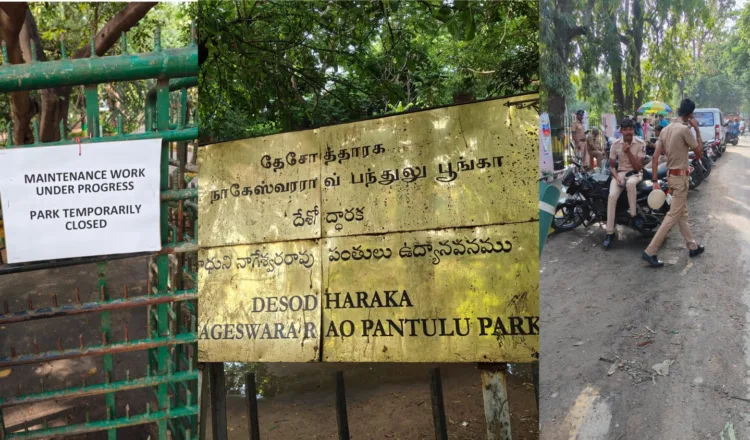In a controversial move reminiscent of the traditional practice of hiding a comb to prevent a marriage, the Dravidian stock DMK government in Tamil Nadu prevented residents of Chennai’s Mylapore from participating in International Yoga Day by locking the gates of a prominent park and deploying a heavy police presence. The official reason given for this action was park maintenance, a justification met with skepticism by many.
While the world celebrated International Yoga Day with events attended by local VIPs, heads of state, students, office workers, women, and housewives, the UN-recognised event, endorsed by the Modi-led Indian government, saw widespread participation. The Modi Govt, which has established the Ministry of Ayush to promote traditional Indian medicine systems like Ayurveda, Yoga, Unani, Siddha, and Homeopathy, has championed this day since its global recognition.
In India, International Yoga Day was marked by significant gatherings, including those led by the Prime Minister, the President, union cabinet ministers, Supreme Court and High Court judges, and bureaucrats, who practiced yoga in various public spaces such as beaches, promenades, cultural halls, and school and college auditoriums. In Chennai, Governor RN Ravi participated in the yoga practice, highlighting the event’s importance in the city.
Anticipating resistance from the Tamil Nadu government, BJP state spokesperson ANS Prasad had earlier appealed to Chief Minister MK Stalin to ensure that International Yoga Day was celebrated in all schools and colleges across the state. In his statement, Prasad emphasised that yoga is celebrated worldwide, including in Gulf countries, and urged the ruling DMK government to support the people of Tamil Nadu in participating in Prime Minister Modi’s initiatives to promote health and happiness.
Despite this appeal, the DMK government did not facilitate the celebrations, which critics argue is part of a broader pattern of minority appeasement and opposition to the BJP. One stark example was the closure of Nageswara Rao Park in Mylapore, an ideal venue for yoga due to its serene and peaceful environment. According to temple activist TR Ramesh, the park was locked under the pretext of maintenance, a claim he disputed given the unusual presence of numerous police officers at both entrances.
Ramesh took to social media platform X to condemn the action, questioning the need for police deployment if the park was genuinely closed for maintenance. He suggested that the real motive was to prevent citizens from observing International Yoga Day. Ramesh highlighted past instances where Hindu practices and celebrations faced government obstacles, contrasting these with the leniency shown towards illegal structures associated with other religions.
Ramesh said in his tweet “The Chennai Corporation has closed down Nageswara Rao Park in Mylapore this morning. The *claimed* reason, the park is closed for maintenance. But a good number of police personnel have been deployed at both entrances of the park. Do they always have police manning the closed gates when the Park is undergoing maintenance? I am told that this has been done only to stop Tamil Nadu citizens observing International Yoga Day in the park today. Remember, Hindus had to go to Court to get approval for celebration of Pran Pratishtha of Sri Ram Mandir? If the Tamil Nadu police are allowed to properly perform their duties of ensuring law and order, preventing crimes like sale of spurious liquor, 40 deaths could have been prevented. But their important job today seems to be preventing yoga observance. Soon, Will it be preventing school children sporting tilak on their foreheads?”
The Chennai Corporation has closed down Nageswara Rao Park in Mylapore this morning. The *claimed* reason,the park is closed for maintenance.
But a good number of police personnel have been deployed at both entrances of the park. Do they always have police manning the… https://t.co/jZTOc7EpY6 pic.twitter.com/P3pw5ec5lr
— trramesh (@trramesh) June 21, 2024
Critics of the Dravidian stock government argue that it systematically opposes Hindu festivals, ceremonies, and customs. They point to the government’s refusal to permit the installation and immersion of Vinayagar idols, demolition of Hindu temples while allegedly protecting illegal mosques and churches, and the prevention of national flag rallies during the 75th year of independence in some areas of Tamil Nadu. They also cite the necessity for legal interventions to conduct RSS events and the initial denial of permission for the Pran Pratishtha ceremony of Sri Ram Mandir, which was only allowed after Supreme Court and High Court orders.
The critics contend that the DMK government perceives yoga as a Hindu ritual and is unwilling to support its growing popularity due to its perceived religious connotations.


















Comments